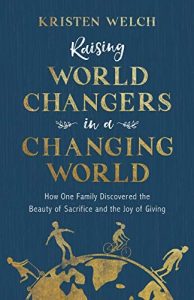I’ve discovered the secret to raising, happy, grateful and successful kids..
Lean in and I’ll tell you…It doesn’t exist.
Every home and every kid is different. That’s one of the things that makes family life so amazing and challenging–we are all unique! There are no two famlies exactly alike. What works for one, might not work for the other. We are all doing the best we can.
But I’m all ears when I hear what works for someone else because you never know–it might work for my family too. The beauty of not being an indifferent parent is we can learn from each other’s mistakes and successes.
A serious risk in our culture is falling prey to becoming an uninvolved parent. Culture will be more than happy to raise our kids if we let it. Between the ever-present damage of a constant social media presence with its unattainable filtered perfection and the danger of giving into passive parenting because standing firm consistently, the risk of negligent parenting is a real enemy.
Uninvolved Parenting: 6 Ways Not to Be an Uninvolved Parent

1. Make Home The Safest Place
“I hope you don’t act this way at school!” Raise your hand if you’ve said it. I have. I used to wonder why my kids would get glowing reports at school, church, and extracurricular activities, and then come home and act like little devils. An older mom once cleared it up for me. “Kristen, isn’t this what you want? You teach them how to act and treat others, and they are doing it where it’s most important. They conform to society’s rules of no touching or talking in the hallway, and when they get home, they just need to let it all out. They feel safe at home—that’s why you see them at their worst.” Well, let me tell you, that was good news for this mom. That’s not to say from that moment on, it was a free-for-all at home. We kept the same structure and rules as we always had, but it helped me understand the difference in the two environments.
I want my home to be a safe place. I want it to be the place they bring their friends and hang out. I want my kids to feel secure enough to confess their struggles and sin and share their successes.
2. Choose Relationship over Rules
My nature is to be a rule follower. Although we’re trying to raise our kids in a grace-filled home, sometimes old habits die hard. It took me a long time to see that rule-following doesn’t always reflect a heart for doing what’s right. When we choose grace over legalism, we are really choosing relationship over rules.
That’s not to say we shouldn’t have rules. I have a long list. But there must be flexibility, too. There will be times when we have to lay aside our rules to save the relationship. For example, early on I made the rule that everyone had to eat everything on their dinner plates every night or else face consequences. I tried to enforce it, but one of my kids has struggled for years with sensory reactions to certain food textures that makes doing what I’ve asked a consistent battle. So instead, I avoid the couple of foods that trigger this kid’s issues and, as a rule, I ask the sensitive eater to try whatever is served because “you just might like it.” And if this kid doesn’t, there is always peanut butter and bread available; I’m not fixing two dinners. (Some of you die-hard “sit there until your dinner is gone, and if you don’t eat it, you’re having it for breakfast” people are cringing right now, I’m sure.) But we’ve found something that works for us, because my way was actually making dinner a nightmare for our family, and it was hurting my relationship with my child.
When our kids push against us, our first reaction is to push back. But many times when they are struggling, they don’t need more discipline—they need more love.
3. Choose to Live in Community
We intentionally spend time with people who want the same results we do. That doesn’t mean it’s perfect or even tidy, but when we let people into our lives and become vulnerable, they are going to see our mess. They will know we don’t have it all together; they will see that we are just like them. We learn better together. Helping our kids connect with believers their age has always been a very high priority for our family. This commitment has been lifesaving in many ways because it has given them positive peer influence in every season.
A few months ago, I sat in a room with other non-profit leaders and we all had cardboard signs in our hands with the words “Me, too” printed across them. Every time someone would share something private and personal–a struggle or a strain, if we identified, we would silently hold up our signs.
And say, “Me, too.” It was a powerful movement of encouragement. We cried and complained and there was compassion.
Every mother has nearly lost a child, looked away for a second, or made a mistake on their watch. My first time was when my firstborn toddled out the sliding patio door in the kitchen while I turned around to switch on the oven for dinner. I didn’t realize she was in the doghouse in the backyard until I’d frantically searched and screamed through the house for her for several minutes.
Parents don’t need guilt or shame heaped on their heads. We have plenty of it already. What we need is to know we aren’t alone. Community reminds us of this truth. Parenting alone leads to uninvolved parenting.
4. Pray for Your Children
Nothing we do or say can ever substitute for bowing our heads and praying for our children. There have been some really hard days in this journey when I’ve gone to bed burdened for one of my kids and slept fitfully, only to face another conflict the next morning. I have wanted to give up many times. And I have found comfort and peace in only one place—on my knees. There is something deeply spiritual and healing about humbling our bodies and our pride and laying the burden at Jesus’ feet.
Prayer is often the last thing we think of when it comes to difficult parenting days. We reserve it for our desperate moments, when there’s an unexpected diagnosis or rebellion. But God wants to walk this path with us. As a mom, nothing makes me feel less alone or more encouraged than giving my parenting burdens to the One who parents me.
5. Stay Connected in a Detached Parenting World
Most parents don’t prepare for adolescence in any way. This is a core problem. When you ask parents of preteens how many of them would like their children to have the same experience they had in adolescence, there aren’t many hands that go up. But those same parents often become increasingly detached as their children move into the adolescent years. It’s critical that as our kids mature, parents do too in their involvement. The older kids get, the more they need their parents.
6. Refuse to Overlook the Moments Right Under Your Nose
In “For Better or For Kids” by Patrick and Ruth Schwenk Life share about life with kids in the house and how fast it becomes. “During this season the busy, hurried life is our new normal. The blessings of a life with balance, rest, and rhythm are a distant memory. With so many demands on our time, it is easy for us to lose sight of our purpose as a family and the love we share as a couple.
When life is moving fast, it’s easy to focus on the time we don’t have.
But when we focus on what we don’t have, we can overlook the moments that are right under our nose.
We are learning to make the most of those bits of time we have alone. Just recently, our kids were playing at a friend’s house. We knew we had about an hour to ourselves. It was tempting to use that precious time to catch up on email, clean, or tackle some of the other things that needed doing.
Instead, we went for a walk. A nice, quiet walk together.
Sometimes redeeming the time we have means sneaking out for a lunch date, enjoying coffee together in the morning, running to the grocery store together, or conversing over a cup of tea at night.
These brief moments are really rather ordinary, but they become significant moments when we share them together.
Time does not come to us wrapped in a nice, neat package. Our gifts of time for each other are not always flashy or romantic. Time often shows up unannounced, in scattered moments. So we do our best to take advantage of the little moments God gives us to cultivate and nurture our marriage. We may not have much when it comes to time together, but how we use what we have matters a lot.”
Neglectful parenting isn’t usually intentional. It can happen when we get too busy, distracted, sidetracked. Living in the moment, loving well, carving out time for memories and moments–these are the ways we stay involved in our kids’ lives.
[LIMITED TIME] Get a Copy of my book Raising World Changers in a Changing World FREE

Almost any parent you ask will tell you that they want their children to be happy, successful adults. But many of us forget (or never knew to begin with) that lasting personal joy is not necessarily found the way the world says it is–through reaching a certain socioeconomic status, having a certain job, buying a certain house, or having a certain amount in one’s bank account. In fact, personal satisfaction comes not from grabbing on to things but from holding them with an open hand and, very often, giving them away.
In this inspiring book, popular parenting blogger and author Kristen Welch shows parents how to discover for themselves and instill in their kids the profound joy that comes from sharing what we have been given–our time, our talents, and even what’s in our wallets–with those who have less. Through powerful personal stories as well as stories from Scripture, Welch offers a tantalizing alternative to status quo parenting that has the power to impact not only our own families but also the entire world.
Claim your FREE copy for a limited time by clicking here and using the code Freeparentingbook.






